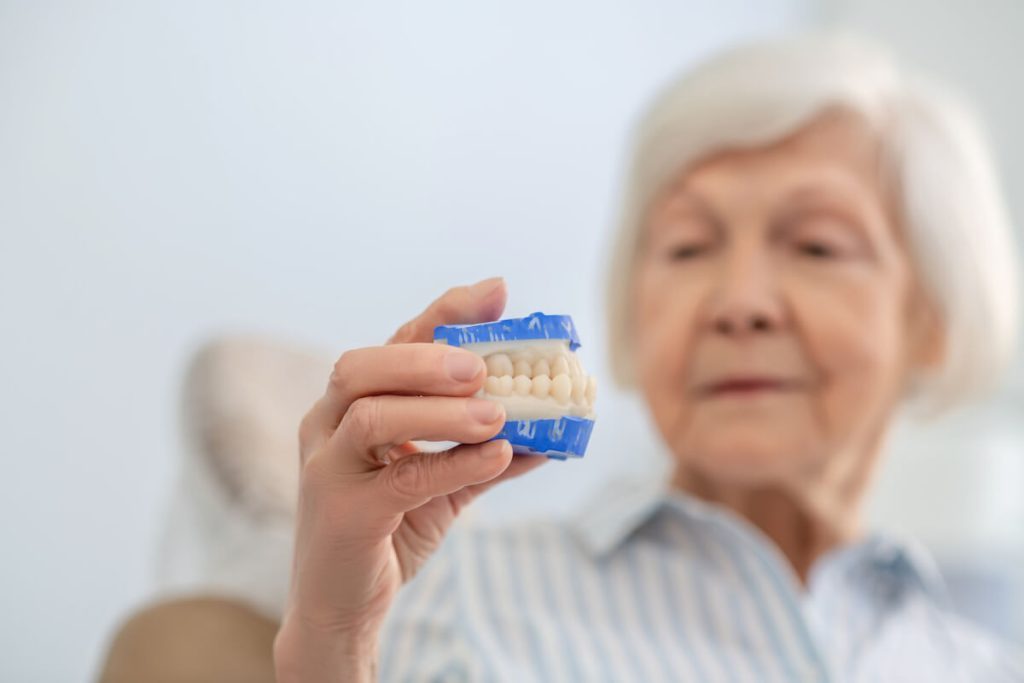How To Make Your Dentures Fit Better And Feel More Comfortable?

Have you ever wondered how to make your dentures fit better? Or maybe you’re so used to ill-fitting dentures that you didn’t realise they could fit more comfortably.
When dentures don’t fit properly, they can cause much pain and impact your ability to speak and eat. But don’t worry. We’re here to answer all your questions about loose-fitting dentures and how to fit them better.
Upper dentures rely on suction for security, whereas lower dentures have no suction and depend on muscles to help keep them in place.
Well-fitting dentures are essential for talking, smiling, laughing, and chewing. Dentures that remain in place and comfortable are vital for social interactions and living confidently. When your dentures don’t fit properly, what can you do?
Signs of poorly fitting dentures and how to make your dentures fit better
Gagging
With dentures in the upper jaw, gagging is usually the cause of the baseplate extending beyond your hard palate. Gagging often causes a loss of suction and the dentures to loosen. Lower dentures causing gagging are generally over-extended at the back of the mouth, under the tongue, which causes the denture to lift when the tongue is moved.
Fortunately, there are simple solutions to improve the fit of your dentures and reduce gagging. A dentist can remove some of the bulk of the material toward the back of the denture. They can also make the acrylic slightly shorter to allow for more distance between the trigger point for your gag reflex and the end of the denture. A few simple adjustments will reduce gagging and make your dentures a more comfortable fit.
Slippage
Dentures that once had a snug fit and have now started to slip when you’re laughing, talking or eating are signs that your gums and jawbone structure have changed. Over time, the bony ridge that supported your dentures shrinks, creating a situation of ill-fitting dentures that no longer conform to the contours of your gums.
Patients often resort to denture adhesive to fill the gaps and secure dentures. However, adhesives were never intended for long-term use. If you’re at the point where you can’t get through the day without adhesive, it’s time to speak to your dentist. If your existing dentures are still in good condition, it’s possible your dentist can reline them. This involves adding new material to certain parts of the denture so it fits your gums snugly once more.
Discomfort and pain
Persistent pain or sore spots in your mouth indicate that your dentures are not fitting correctly. This happens when the denture exerts uneven pressure on your gums, causing irritation and discomfort. Left untreated, these sore spots can lead to infections or more severe oral health issues.
Relieving the sore spot disperses the pressure over the entire denture surface, helping to give the denture a better, more comfortable fit and making the wearer feel better. Your dentist will have the materials and the knowledge to adjust areas rubbing your gums and can usually fix the problem in one short visit.
When it comes to knowing how to make your dentures fit better, your best bet is to contact your dentist. They can make simple adjustments as mentioned above, or an alternative solution may be to enquire about an implant retained denture.
Implants prevent dental slippage and halt bone loss, helping to maintain facial structures.
Maintenance Tips for Comfortable Dentures
Even with well-fitting dentures, proper care ensures longevity and comfort. Here are some tips to keep your dentures in top shape:
- Use a soft-bristle brush and denture-specific cleanser daily to clean your dentures. Avoid harsh toothpaste that can scratch the surface.
- To keep your dentures hydrated and avoid warping, soak them for the entire night.
- Visit your Northbridge dentist regularly for check-ups and adjustments. Routine visits can catch potential issues early, even if dentures are fine.
- Monitor changes in fit or comfort and report them to your dentist immediately. Over time, your gums and jawbone may change, requiring adjustments.
Dentures Management in Northbridge
Don’t suffer in silence!
Living with poorly fitted dentures is painful and can lower self-esteem and general quality of life. Whether it’s a minor adjustment or a complete overhaul with implant-retained dentures, help is available.
At My Local Dentists, we’re committed to restoring your smile and comfort. Our experienced team can provide tailored solutions so that your dentures feel natural and fit flawlessly. Why endure the pain and inconvenience any longer?
Book your appointment today and take the first step toward a stable, comfortable, and confident smile.
Call your Northbridge dentist today at (02) 9000 1383 or visit us at Shop 20A Northbridge Plaza, 79-113 Sailors Bay Road in Northbridge.
